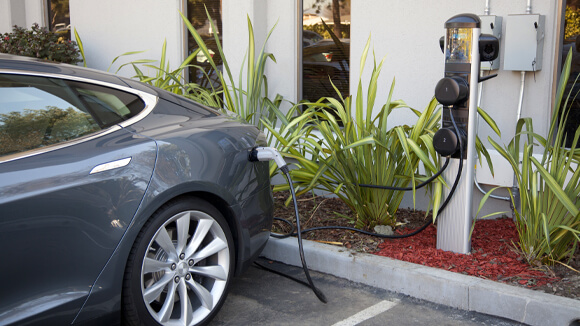Should your business be investing in electric vehicles?
21/10/2019 00:00:00by Mark McKenna21/10/2019 00:00:00Should your business be investing in electric vehicles?Bluedrop Services

The pressure is on for businesses to make environmentally friendly choices to reduce the impact they have on carbon emissions. Companies are now deemed responsible for the impact they have on the environment. If you’re a business with a fleet of vehicles, it can be difficult to see how you can cut your carbon footprint sufficiently to meet government targets.
But there is a simple solution: Electric vehicles. By investing in electric vehicles in your fleet, you can significantly reduce your carbon footprint.

Moving towards electric
Electric vehicles are growing in popularity, which means they are becoming more and more available, particularly for businesses. Even the government has pledged to invest in the research and development of electric vehicles.
This surge of investment has allowed manufacturers to develop vehicles that are not only affordable, but more efficient. This means for fleets, going electric is now a lot more appealing that it was before in order to cut carbon emissions. Electric or hybrid vehicles may even reduce your fleet insurance premiums.
Switching to electric can save up to 2.5 tonnes of carbon dioxide emissions a year, reducing carbon emissions by around 40%. When you move towards electric in your vehicles fleet, you’re much likely to hit sustainability and corporate responsibility targets.
How much does it really cost?
Although electric fleets are becoming more affordable, there is still a higher purchase cost overall. Despite this, they actually cost a lot less to run over time due to the fact they are rechargeable. The cost of charging is a lot less than the cost of fuel.
There are also government incentive programmes which can lower the initial cost of the vehicle in order to encourage more people to purchase them. What’s more, electric vehicles are easier and cheaper to maintain.
If you go electric, you don’t need the oils, lubricants and other fluids like you would on a non-electric vehicle, which gets costs down and reduces waste.
Save money on tax
One of the additional benefits of running an electric fleet is the money that you’ll save on tax. The government has introduced a number of taxes on petrol and diesel fleets. This includes higher vehicle exercise duty, diesel tax, surcharges for parking in certain areas, higher taxes if your vehicles don’t meet the Real Driving Emissions 2 (RDE2) standard and an increase on company car tax by 1%.
London has also introduced the Ultra-Low Emission Zone (ULEZ) charge which costs between £12.50 and £100 a day, per vehicle if you go into central London. Electric vehicles, however, can go free of charge.
How far can an EV go?
There has been some concern over the distance that an electric vehicle can travel on a single charge. This very much depends on the size of the engine, the weight the car is carrying and speed. Some vehicles can reach over 300 miles on a single charge, but that’s at the very top end of the spectrum.
But as more and more investment is being put into the development of electric vehicles and the charging infrastructure, the distance travelled is on the up.
The expanding infrastructure
Currently, the infrastructure of electric charging points is limited, but this is expected to change over the next few years. There are a number of projects already underway to increase and expand the charging infrastructure for electric vehicles.
There are over 16,500 public charge points for electric vehicles, and you can even install your own charge point at your own home or business premise. You can also access charging points at many supermarkets and public car parks. Rapid charge is also available and as little as 20 minutes can recharge a battery up to 80%.
Is investing in EV’s right for you?
If you’re reading this, then it is likely that you’ve thought about investing in electric vehicles for your fleet. In fact, with the current government push on reducing carbon emissions, then it’s a great time to start investing in an electric fleet.
Introducing electric vehicles to your fleet can be a big task, so you might want to consider setting your targets across your fleet to reduce emissions gradually. The higher purchase prices can be off-putting, but with more investment in this area, you’re likely to see prices drop to a more affordable level as well as reap the benefits from reduced maintenance and running costs.
The integration of EV’s within your fleet can help you reach corporate social responsibility and emissions targets without breaking the bank.
Return to blog menuWant to find out more about Bluedrop's Motor Fleet Insurance?
Call our friendly team now for the right insurance cover - at the best price
+441489780491
Calls recorded for training and quality.



 Privacy and Cookie Policy
Privacy and Cookie Policy